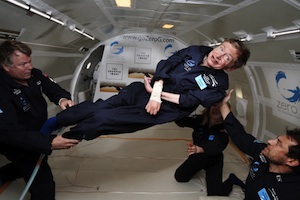
Congratulations to the new Stephen W Hawking Professor of Cosmology!
There was a brief pause in research at the Department of Applied Mathematics and Theoretical Physics at the University of Cambridge (DAMTP, also the home of Plus) this afternoon to celebrate the newly established Chair in Cosmology. The Chair, funded by a $US 6 million donation from Avery-Tsui Foundation, is named after Stephen Hawking and he will be the first to hold the Professorship. Paul Shellard, Director of the Centre for Theoretical Cosmology, said that the honour recognised Hawking's contributions to changing our understanding of the Universe.

Stephen Hawking experiencing zero gravity (Image: NASA)
"When I arrived at DAMTP in 1962 cosmology was a speculative science and we didn't know if the Universe had a beginning or had existed forever in a steady state," Hawking said. He went on to say that the new Professorship recognised the role of the department in taking cosmology from this speculative start to the remarkably successful field it is today.
We'd like to congratulate Hawking on his new post (and thank him for the cake and champagne!) and look forward to the next exciting discovery from our cosmologist neighbours.
You can read more about Hawking's life and work in his articles 60 years in a nutshell and A brief history of mine, and in our coverage of his 60th and 70th birthday symposia. And of course, there's much more about cosmology on Plus.